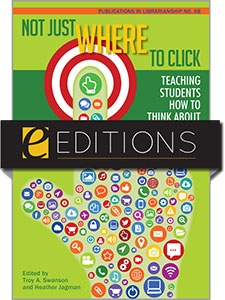
Not Just Where to Click: Teaching Students How to Think about Information (PIL #68)—eEditions e-book
The download link for this product can be found on the final confirmation screen after you complete your purchase, and may also be accessed from your Account Profile. For more information about ALA eEditions file types and how to view them on eReaders, desktop computers, and other devices, see this page.
Primary tabs
You don't need to be an ALA Member to purchase from the ALA Store, but you'll be asked to create an online account/profile during the checkout to proceed. This Web Account is for both Members and non-Members. Note that your ALA Member discount will be applied at the final step of the checkout process.
If you are Tax-Exempt, please verify that your account is currently set up as exempt before placing your order, as our new fulfillment center will need current documentation. Learn how to verify here.
- Description
- Table of Contents
- About the authors
- Reviews
Winner of the 2016 ACRL Instruction Section Ilene F. Rockman Award
Not Just Where to Click: Teaching Students How to Think about Information explores how librarians and faculty work together to teach students about the nature of expertise, authority, and credibility. It provides practical approaches for motivating students to explore their beliefs, biases, and ways of interpreting the world.
This book also includes chapters that bridge the gap between the epistemological stances and threshold concepts held by librarians and faculty, and those held by students, focusing on pedagogies that challenge students to evaluate authority, connect to prior knowledge and construct new knowledge in a world of information abundance. Authors draw from a deep pool of perspectives including social psychology, critical theory, and various philosophical traditions.
Contributors to the nineteen chapters in this volume offer a balance of theoretical and applied approaches to teaching information literacy, supplying readers with accessible and innovative ideas ready to be put into practice.
Not Just Where to Click is appropriate for all types of academic libraries, and is also suitable for library and information science curricula and collections.
Introduction. More than Just Where to ClickTroy A. Swanson and Heather Jagman PART 1. Bridging the Gap between Librarians, Students, and Faculty: Conceptualizing Information 1.1 Librarian and Faculty Epistemologies and Beliefs
Chapter 1. Theories of Knowledge in Library and Information ScienceLane Wilkinson Chapter 2. Beyond Tools and Skills: Putting Information Back into Information LiteracyBeth McDonough Chapter 3. Librarianspeak: Metaphors That Reflect (and Shape) the Ethos and Practice of Academic LibrarianshipMaryBeth Meszaros and Alison M. Lewis Chapter 4. The Social Life of Knowledge: Faculty EpistemologiesBarbara Fister
1.2 Student Epistemologies and Beliefs
Chapter 5. Generation Z: Information Facts and FictionsAshley Cole, Trenia Napier, and Brad Marcum Chapter 6. Search Epistemology: Teaching Students about Information DiscoveryAndrew D. Asher Chapter 7. Studying Sources: Truth, Method, and Teaching BibliographyPatricia Brown Chapter 8. Towards an Assumption Responsive Information Literacy Curriculum: Lessons from Student Qualitative DataRob Morrison and Deana Greenfield
PART 2. Making It Work: Teaching Students about Information 2.1 The Nature of Expertise, Authority, and Credibility
Chapter 9. Expertise and Authority in an Age of CrowdsourcingWilliam B. Badke Chapter 10. Knowledge Societies: Learning for a Diverse World Alison Hicks Author(ity): Engaging Students in Scholarship Brian W. Young and Daniel Von Holten
Chapter 12. From Counting Sources to Sources That Count: Reframing Authority and Accountability in First-Year CompositionNicole Walls and Amy Pajewski
2.2 Point of View, Belief, and Source Bias
Chapter 13. Through a Mirror Darkly: A Postmodern Approach to Teaching Expertise, Authority, and Bias Stephen A. Sanders Chapter 14. Librarians and Students: Making the ConnectionsJulie Obst and Joe Eshleman Chapter 15. Fragmented Stories: Uncovering News Bias through Information Literacy InstructionWillie Miller
2.3 Interpreting the World
Chapter 16. Logical Fallacies and Sleight of Mind: Rhetorical Analysis as a Tool for Teaching Critical ThinkingJessica Critten, Anne C. Barnhart, and Craig Schroer Chapter 17. Scholarly Storytelling: Using Stories as a Roadmap to Authentic and Creative Library ResearchRebecca Halpern and Lisa Lepore Chapter 18. Doing It Yourself: Special Collections as a Springboard for Personal, Critical Approaches to InformationLucy Mulroney and Patrick Williams Chapter 19. Witnessing the World: Journalism, Skepticism, and Information LiteracyLaura Saunders
Biographies Index
Heather Jagman
Heather Jagman is the coordinator of reference, instruction, and academic engagement and the subject liaison to the Theatre School at DePaul University Library in Chicago. She was an ERIAL Project participant and a 2013 ACRL IMLS Assessment in Action grant recipient. She is particularly interested in information literacy and library user behavior.Troy A. Swanson is the teaching and learning librarian and the library department chair at Moraine Valley Community College in Palos Hills, Illinois, where he is also the president of the Moraine Valley Faculty Association. Troy is the author of the book Managing Social Media in Libraries: Finding Collaboration, Coordination, and Focus and coauthor of the textbook Why White Rice? Thinking through Writing. He has published on social media, website usability, and information literacy. Troy is also a contributor to the Tame the Web blog.
Troy A. Swanson
Troy A. Swanson is the teaching and learning librarian and the library department chair at Moraine Valley Community College in Palos Hills, Illinois, where he is also the president of the Moraine Valley Faculty Association. Troy is the author of the book Managing Social Media in Libraries: Finding Collaboration, Coordination, and Focus and coauthor of the textbook Why White Rice? Thinking through Writing. He has published on social media, website usability, and information literacy. Troy is also a contributor to the Tame the Web blog.
"If you are looking to raise the bar in your IL sessions, I highly recommend this book."
— College & Research Libraries


